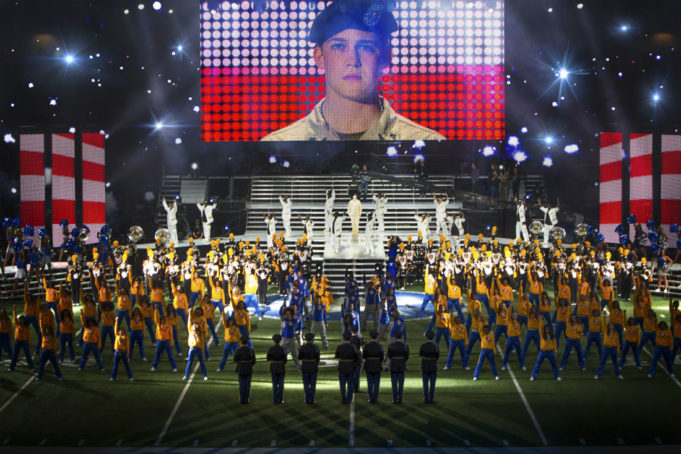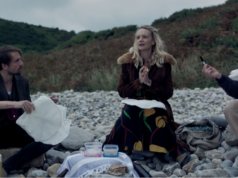Unfortunately, the biggest accomplishment of Billy Lynn’s Long Halftime Walk is to draw attention to the Ben Fountain novel that it’s based on. That book was written by a gifted writer with a knack for surprising, stark poetic images. Ang Lee’s big, expensive film treatment, unfortunately, doesn’t have that.
The title character is Spc. William Lynn (Joe Alwyn), who in 2004 is an Iraq War veteran returning home for a triumphant whirlwind tour of America. He and the rest of his Bravo Squad got into a firefight over there that was broadcast on TV, and now the government is drumming up support for the war by promoting Billy and his surviving comrades. The tour climaxes at a Thanksgiving Day football game in Dallas, where he and the other Bravos are part of the halftime entertainment along with Destiny’s Child. The stop allows Billy to visit his family in a fictitious nearby Texas town, where his vociferously antiwar sister (Kristen Stewart) wants him to go AWOL and claim post-traumatic stress before he re-deploys.
Before I get started I need to note: The movie was shot in 120 frames per second (industry standard is 24) and is being shown in 3D in New York and Los Angeles, where the reviews of the new format have been mixed. Since the theaters here are playing the movie in 2D, the film was shown to me in 2D, so unless you’re reading this article from the coast, I am talking about the same movie you’re seeing.
Usually, I hate it when movies invent fake pro sports teams, but if you watch this film, you’ll understand why the NFL and the Dallas Cowboys didn’t want their names on this. The movie is skeptical and perhaps even cynical about not the military per se but the way the pop culture (as represented by pro football) relates to the military. We as civilians don’t really understand what soldiers go through when they see combat, and there’s no practical way for us to acquire that knowledge, so most of the time we just call them heroes and hope that’s good enough.
The result of that disconnect is something like the garish, fireworks-laden halftime tribute to the soldiers, which seems hopelessly tone-deaf and inadequate when viewed from their point of view. Even well-wishers who meet the soldiers wind up making insensitive comments that they have to absorb. Aside from that, the Dallas team is in hopeless disarray trying to accommodate their special guests. (The whole organization seems to suck, despite Richard Sherman and J.J. Watt portraying two of its players.) Things are no better outside the stadium, as a Hollywood producer (Chris Tucker) travels with the soldiers and tries to broker a lucrative movie deal for them; though they only hear his side of his phone conversations, they can tell that he’s finding it rough sledding. The civilian world’s lack of understanding is supposed to be tragic, and it’s something like that in Fountain’s book.
Unfortunately, the movie is filled with miscalculations. Lee’s grasp on American culture is such that occasional scenes like the Bravos’ encounter with a boorish fan (Matthew Barnes) pops from the screen, but he doesn’t share Fountain’s affinity for painting American life in neon satirical tones. This movie needed to be more grotesque, and that’s not something you go to Lee for. Unlike Fountain, Lee actually shows the battle that made the Bravos famous, which proves to be a mistake. Vin Diesel is wrong as the Bravos’ staff sergeant who’s into Hindu spirituality, and Steve Martin is even more badly off as the Dallas team’s smug owner. Even Billy himself comes off as a cipher in the hands of British newcomer Alwyn. Maybe Lee and writer Jean-Christophe Castelli should have left in the book’s subplot hinting that Billy’s in love with his sister.
This isn’t a total failure. Garrett Hedlund does fine work as the squad’s sergeant who keeps the guys in line on the tour, and Stewart excels once again, here playing a loving, opinionated, facially scarred girl chafing at her family’s dysfunction. (By the way, this character is specified in the book as going to college in Fort Worth, so try to imagine Kristen Stewart as a TCU student.) Lee brings some isolated moments of visual flair, too, but they don’t come close to adding up to the meditation on war and its effects on soldiers and civilians that Billy Lynn’s Long Halftime Walk so badly wants to be.














I’m now informed that the AMC Highland Village in Addison will have a 3D version screening at 120 frames per second, though it will still not be the same version as the ones in New York and L.A.